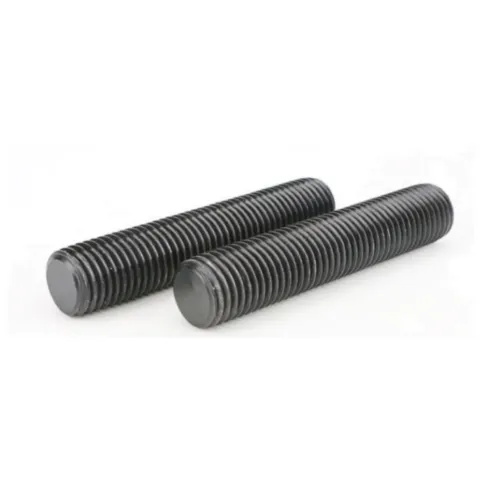Strong Hold
May . 20, 2025 16:00 Hoki ki te rarangi
Strong Hold
When it comes to basic construction or general hardware requirements, grade4.8 hex bolts are among the most frequently used fastening solutions. These bolts are made from low to medium carbon steel and are ideal for applications that require moderate strength but not high tensile demands. From assembling metal frames and fencing panels to securing wooden structures, the popularity of grade4.8 hex bolts lies in their cost-effectiveness and easy availability. Because of their strength rating, they are often used in light to medium-duty applications such as home renovations, automotive parts, and light industrial usage. Unlike high-tensile bolts, grade4.8 variants are not heat treated, making them more ductile and easier to work with, especially in environments that don’t exert extreme pressure or weight.

Applications and Advantages of Grade8.8 Hex Bolts in Industry
In more demanding industrial and mechanical settings, grade8.8 hex bolts provide a higher strength alternative. These bolts are manufactured from medium carbon steel and are typically heat treated to enhance their mechanical properties. Their strength rating makes them suitable for high-torque and high-stress applications, such as in heavy machinery, structural steel assembly, automotive engines, and infrastructure development. Their high yield and tensile strength mean they are less likely to deform under pressure. This makes them the go-to fastener in load-bearing and safety-critical environments. Unlike their lower grade counterparts, grade8.8 hex bolts can support the mechanical integrity of bridges, wind turbines, and large mechanical assemblies, ensuring safety and long-term reliability.
Why Carbon Steel Hex Bolts Are a Practical Choice
Across both residential and industrial uses, carbon steel hex bolts are valued for their balance of strength, affordability, and machinability. Carbon steel, depending on its content and treatment, offers varied mechanical performance, which makes it a versatile material for bolt production. These hex bolts can be surface treated—galvanized, zinc-plated, or black oxide coated—for enhanced corrosion resistance, especially when used in outdoor or humid environments. From assembling furniture and scaffolding to joining automotive frames and pipelines, carbon steel hex bolts ensure dependable fastening with excellent cost-to-performance ratios. Due to their adaptability, carbon steel hex bolts are also commonly used in infrastructure projects, including railway constructions and utility poles, making them an essential component in both temporary and permanent assemblies.
Comparing Grade4.8 Hex Bolts and Grade8.8 Hex Bolts in Daily Use
Choosing between grade4.8 hex bolts and grade8.8 hex bolts depends largely on the nature of the project and load requirements. For DIY tasks, light metal joints, or non-critical structures, grade4.8 bolts offer a suitable and economical solution. Their lower tensile strength is sufficient for lighter loads, and they are easier to cut or remove if needed. However, when safety and durability are paramount—especially in commercial construction, automotive, or mechanical systems—grade8.8 bolts are the safer bet. These bolts resist stretching and breaking under heavy pressure, ensuring longevity and stability. While grade8.8 bolts are more expensive and may require more specialized tools for installation and removal, the added security they provide often outweighs the cost difference, particularly in demanding environments.
Where Carbon Steel Hex Bolts Fit in Modern Engineering
The use of carbon steel hex bolts extends beyond basic construction into cutting-edge engineering domains. They are frequently used in pre-engineered buildings, electrical towers, and equipment mounting systems. Their compatibility with a wide range of coatings means they can be customized for different climates and environments—from coastal marine areas to arid desert zones. Engineers favor carbon steel hex bolts not only for their physical performance but also because they maintain consistent quality under mass production. This ensures that every bolt performs to the same standard, which is crucial in modern engineering projects that rely on precision and uniformity. Whether used in building a farm silo or erecting a telecommunication mast, carbon steel hex bolts continue to support structural integrity in the ever-evolving landscape of construction and manufacturing.
Carbon Steel Hex Bolts FAQs
What are the typical applications of carbon steel hex bolts?
Carbon steel hex bolts are used in construction, automotive, infrastructure, and light to heavy machinery assembly due to their strength and durability.
Are carbon steel hex bolts corrosion-resistant?
They can be treated with coatings like galvanization, zinc plating, or black oxide to resist corrosion, especially in outdoor or humid environments.
How do I choose between grade4.8 and grade8.8 hex bolts?
Choose grade4.8 for low-stress applications and grade8.8 for high-stress, safety-critical environments that require greater strength and reliability.
Can carbon steel hex bolts be reused?
If they haven’t been stretched or damaged during initial use, carbon steel hex bolts can often be reused, but it's important to inspect them first.
Are carbon steel hex bolts suitable for marine environments?
They can be used in marine settings if treated with appropriate anti-corrosion coatings, but stainless steel is often preferred for long-term exposure to saltwater.
Nga korero hou
-
Bolts for Lawn Mower Handle Supplier | OEM & Rust-Resistant
RongorongoNov.17,2025
-
Silver Screws Supplier | Corrosion-Resistant, Bulk & Custom
RongorongoNov.17,2025
-
Cabinet Bolts Supplier | OEM, Bulk Stock, Fast Shipping
RongorongoNov.17,2025
-
Axle Nuts Supplier - OEM-Grade, ISO-Certified, Fast Delivery
RongorongoNov.17,2025
-
Wire Bolts Suppliers – OEM Factory Prices, ISO Quality
RongorongoNov.11,2025
-
Bolts for Lawn Mower Handle Supplier – OEM & Anti‑Rust
RongorongoNov.11,2025
